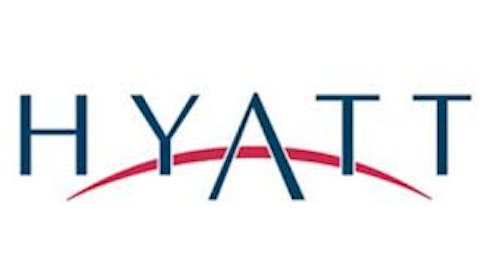The travel business has always been very dependent on the health of the economy, particularly the unemployment rate and consumer confidence level. With the economic recovery beginning to actually look sustainable, maybe now is a good time to get back into this sector. One of my favorite plays on the increase in travel over the next few years is Marriott International Inc (NYSE:MAR), one of the world’s largest hotel companies.
Marriott: Past, Present, and Future
Marriott International Inc (NYSE:MAR) owns or franchises over 3,800 hotel properties with a total of more than 660,000 rooms. It operates under the Marriott International Inc (NYSE:MAR) brand name, as well as Ritz-Carlton, Renaissance Hotels, Courtyard by Marriott International Inc (NYSE:MAR), Fairfield Inn, SpringHill Suites, Residence Inn, and TownPlace Suites.
After the real estate bubble burst, times got especially tough for Marriott International Inc (NYSE:MAR)’s timeshare business, and tried to change its strategy by lowering timeshare prices and stopping future development, which wound up resulting in losses of about $750 million during the third quarter of 2009. Eventually, the company decided that it had enough of the timeshare business and spun it off as Marriott Vacations Worldwide Corp (NYSE:VAC) in order to focus strictly on the more lucrative hotel business.
Ironically, since the spin-off, the timeshare business has done very well. Marriott Vacations Worldwide Corp (NYSE:VAC)’s revenue was about $1.5 billion last year, and is projected to rise to $1.7 billion this year on strength in both real estate and discretionary spending.
As the chart below indicates, after a significant drop in revenues once the financial crisis hit, Marriott International Inc (NYSE:MAR)’s business has certainly rebounded and then some, with 2012 being the company’s best year (revenue-wise) in its history, adjusting for the spun-off timeshare business.

**Note: 2012 results and 2013-2014 consensus projections are adjusted to account for the effect of the timeshare business’ spin-off.
The company’s strategy lately has been to reduce their hotel ownership in favor of a more predictable and lucrative business model of franchising and management. As the economy continues to improve, more people will travel, both for business and leisure, and the number of properties that Marriott franchises should steadily rise over the next several years.
The Numbers
Marriott’s 2012 revenues of $11.8 billion are expected to rise to $12.7 billion this year and $13.6 billion next year, for revenue growth of 7.8% and 7.1% respectively. This is expected to produce annual earnings growth of 18.6% and 17.2%, a result of a combination of higher revenues and higher operating margins. Shares trade for about 22.5 times TTM earnings, which seems very reasonable given the forward growth rate.



